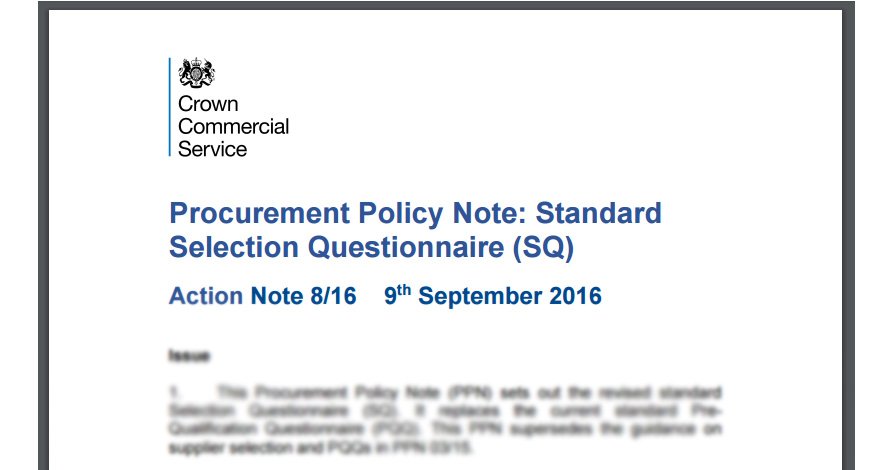Article Details
If you have recently tendered for a public sector contract, you will have noticed some changes in the first round of the process. The pre-qualification questionnaire (PQQ) phase has now been replaced by a new preliminary standard selection form. Dictated by a template designed by the Crown Commercial Service (CCS), the selection questionnaire (SQ) will now be used in all supplier selection in public procurement.
For more information on the how the SQ is replacing the PQQ, please visit our Standard Selection Questionnaire writing services.
What are the aims?
The PQQ was designed to simplify the supplier selection process, particularly for SMEs, and provide a shortlisting stage of the bidding process. The SQ has been introduced to refine this framework further, while retaining the focus on suppliers’ financial and professional eligibility.
It has also been developed to ensure ongoing compliance with the European Single Procurement Document (ESPD), a self-declaration form used in public procurement procedures by public buyers and businesses across the EU. It makes the tendering process faster by providing a uniform framework of requirements for suppliers, and enabling self-declaration for a range of suitability criteria. This means that suppliers can submit their ESPD during the selection stage rather than full tender documents.
When does it take effect?
Authorities should stop using the PQQ and adopt the new SQ template with immediate effect. It is recommended that authorities issue the SQ in digital format only, but they have until 2018 before this directive becomes mandatory for all releases of tenders. Contracting authorities using e-procurement systems will need to check that their providers are now using the SQ.
Who will it affect?
The SQ must be used by all contracting authorities in England, and those in Wales and Northern Ireland that exercise wholly or mainly reserved functions for procurements above the EU threshold (currently £106,047 – £164,176). In practice, this means that, if you are an SME that bids for service-based contracts, you are very likely to come across the SQ, if you haven’t already done so.
What’s inside?
Much of the content and structure of the SQ will be familiar to anybody who has tendered within the last two years. Like the outgoing PQQ, it is divided into three main modules:
✓ Supplier information
✓ Exclusion grounds
✓ Selection criteria
The CSS has provided guidance where you can also view the standard SQ template. To view this, click on the image below.

Procurement Policy Note: Standard Selection Questionnaire
The questions in parts 1 and 2 cannot be amended. Part 3 can only be amended if the change is reported to the CCS Mystery Shopper Scheme beforehand. Changes that need to be reported include amendments to the wording of the standard questions, and the introduction of additional questions that are included but not specific to the individual procurement.
Questions relating directly to technical and professional ability, however, can be included without notification to the scheme, although expect to still be completing the now familiar ‘previous contract examples’ table!
The recent focus on self-certification has been retained and extended, with new declaration sections introduced. Obligations to self-certify compliance are now extended to any other supplier being relied on to meet the selection criteria, in addition to the primary supplier. Subcontractors, partners or parent companies, therefore, may be called upon to self-certify to sections 1 and 2 in the same way as the main supplier by providing the same information, and this means co-ordinating and confirming arrangements prior to the SQ.
Evidence of additional supplier compliance does not have to be requested until award stage, though the winning bidder’s evidence must be checked prior to award. Evidence can be requested at an earlier stage, however, if the awarding authority decides to do so.
As such, there is an increased importance on studying the specification in greater detail to allow yourself more time to confirm essential supplier arrangements, and to verify that your suppliers can actually deliver all that they claim they can. Going into a submission without these arrangements in place could lead to a large amount of work, points deductions or an early withdrawal if evidence is suggested but cannot be supplied.
Changes have also been made to section 3, selection criteria:
✓
The environmental and social sections have been removed as specialist modules and integrated into discretionary exclusion grounds.
✓
Sections on health and safety and equal opportunities have been removed. Instead, new modules are to be used when applicable on skills, apprenticeships and, for any contract involving construction or refurbishment, the provenance of steel.
✓
New questions on modern slavery and supply chain management have been introduced.
✓
Questions on tax fraud and tax avoidance have been removed.

What does this mean for suppliers?
SMEs will find that the SQ simplifies the initial stage of the tendering process overall, but larger firms will need to consider:
✓ Modern Slavery Act compliance
Large companies with complex supply chains will need to provide evidence that a) suppliers comply with the Modern Slavery Act, and b) they have a process for monitoring compliance.
✓ Skills development & apprenticeship initiatives
Familiarity with the service specification will be key here, as different authorities will have their own expectation for successful bidders to provide apprenticeships and develop skills.
✓ Steel sourcing
The process for procuring steel will need to be fully auditable, with evidence of effective supply chain management and transparency of procedures.
There will be greater incentives for companies of all sizes to manage their intended suppliers and sub-contractors at an earlier stage, with the need for self-declaration from critical suppliers. Overall, however, the transition from PQQ to SQ does represent a streamlining of the process, owing to a range of new self-declaration sections, and should encourage first-time ventures into public procurement for a new generation of SMEs.
